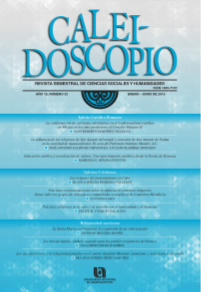The confrontation of identity trends in Catholic traditionalism in Mexico in the years after the Second Vatican Council
DOI:
https://doi.org/10.33064/32crscsh549Keywords:
traditionalism, sedevacantism, lefebvrism, antiprogressivismAbstract
Catholic traditionalism has been developed as a process of construction of identities, from the opposition to several of the innovations that brought the Second Vatican Council. Identities in the mexican catholic traditionalism can be classified in three main currents: the sedevacantism, which argues that the see of Rome is vacant since John XXIII, the lefebvrism represented by the Priestlly Fraternity of Saint Pius X which recognizes the popes after the council as rightful, but refuses to obey them and the radical post-conciliar anti-progressivism, which maintains obedience and full recognition to the papacy but rejects most progressive innovations. Two of these identitary currents, sedevacantism and radical postconciliar antiprogressivism, despite their matches, faced each other through a strong controversy, which served as part of a process of construction of identities based on differentiation with respect to otherness.Downloads
Downloads
Published
How to Cite
Issue
Section
License
Licencia Creative Commons Atribución-NoComercial-CompartirIgual 4.0 Internacional
El lector es libre de compartir o adaptar el material en cualquier medio o formato bajo las condiciones siguientes: (a) debe reconocer adecuadamente la autoría, proporcionar un enlace a la licencia e indicar si se han realizado cambios; (b) no puede utilizar el material para una finalidad comercial y (c) si remezcla, transforma o crea a partir del material, deberá difundir sus contribuciones bajo la misma licencia que el original.
Resumen de la licencia
https://creativecommons.org/licenses/by-nc-sa/4.0/deed.es_ES
Texto completo de la licencia
https://creativecommons.org/licenses/by-nc-sa/4.0/legalcode
Cada autor es responsable del contenido de su artículo. En el caso de un texto colectivo, el primer autor asume la responsabilidad intelectual de los resultados del proceso editorial; los autores son responsables de obtener la licencia de autor para reproducir materiales gráficos o fotográficos que pertenecen a terceros.
Los autores asumen plena responsabilidad en el caso de falsificación de datos o falta de autenticidad en la investigación. Se comprometen, también, a no reutilizar trabajos ya publicados, total o parcialmente, para presentarlos en otra publicación.
Estas condiciones aplican tanto a la versión impresa como a la versión electrónica de la revista.


















